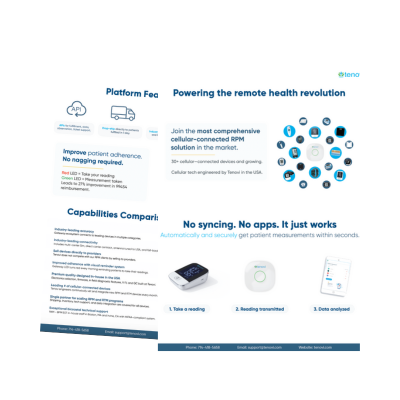Fluctuations in body weight are one of the earliest signs of chronic heart failure. This makes weight monitoring for congestive heart failure (CHF) a critical part of care. Stepping on the scale daily for weight measurements can detect spikes in weight from fluid retention, often days before symptoms become severe. Research shows that daily weight monitoring helps identify early-stage CHF and reduces hospital readmissions because providers can adjust treatment and medication promptly.
This article explores weight monitoring for congestive heart failure is necessary and its effectiveness.
What is Congestive Heart Failure?
Nearly 500,000 Americans are diagnosed with congestive heart failure yearly, and 6.5 million over the age of 20 have heart failure. Congestive heart failure means it is difficult for the heart to pump blood throughout the body. Of course, a body depends on the heart to effectively pump nutrient-rich blood to cells, which need a sufficient blood supply to function correctly.
Individuals with congestive heart failure may experience symptoms such as:
- shortness of breath
- swelling in the abdomen (ascites) or legs
- loss of appetite
- chest tightness/discomfort/pain
- fatigue
- dizziness
Congestive heart failure can be caused by:
- diabetes
- hypertension
- coronary artery disease
- blood clots/ heart attacks
- kidney disease
Weight Monitoring and Congestive Heart Failure
Weight gain is typically one of the first signs of congestive heart failure. While weight gain may not seem harmful, it can be a precursor to more serious symptoms and conditions. If a patient’s weight fluctuates by more than 3 pounds daily, their remote weight scale device sends a real-time alert to the clinician.
Remote patient monitoring studies dating back to 2011 suggest that patients monitored remotely are less likely to have readings fall outside a healthy range. Daily CHF weight monitoring allows patients to stay on top of managing chronic heart failure and work on preventative care rather than treatment.
Beyond CHF, early detection through RPM and cardiology telehealth programs also help to prevent the development of other heart disease conditions such as pulmonary hypertension, irregular heartbeat, heart valve disease, and sudden cardiac arrest.
Tips for Remote Weight Monitoring for Congestive Heart Failure
When done right, CHF remote weight monitoring can be an effective way to manage congestive heart failure. Various factors can cause weight to fluctuate throughout the day. Therefore, it’s critical to ensure that patients understand how to weigh themselves properly and consistently.
For the most accurate results while using a remote patient monitoring scale, the following is suggested:
- Take a weight measurement the same time every day (preferably first thing in the morning.)
- Wearing similar clothes or nothing at all for each weigh-in (to prevent the weight of the clothes from drastically affecting the reading.)
- Being mindful of food and fluid intake before weigh-in.
Managing Congestive Heart Failure
Hospitalizations for heart failure are a large burden on the U.S. healthcare system. Moreover, CHF remains the number one cause of hospitalizations in our Medicare population. Fortunately, nearly 50% of hospital readmissions due to heart failure are preventable.
Lack of adherence to prescribed treatment care is a significant factor in hospital readmissions. A pilot study published in PLOS One notes that RPM device reminders help promote self-care treatment plans and reduce readmissions. The authors suggest mobile health-driven interventions such as an activity tracker and scale for CHF weight monitoring.
Managing congestive heart failure does require consistency. Below are some best practices to help keep heart health in check.
1) Daily Weigh-ins
Remote patient monitoring is meant to aid in providing better care between visits. Daily weigh-ins with a remote monitoring device track daily measurements between visits. They also keep the patient accountable as they know their physician is receiving a steady stream of data and analyzing it.
Clinicians can monitor their patients’ progress and detect concerns early. For instance, doctors are alerted if too much weight is gained in a single day. Quick access to this data enables the physician to promptly take action, such as adjusting medications or treatment plans.
2) Reducing Sodium Intake
Excess sodium in the diet can cause fluid retention. Therefore, patients are encourages to avoid high-sodium foods and adopt a more whole-food diet. Processed foods are typically very high in sodium, so more fruits, vegetables, and whole grains are recommended.
3) Regular Exercise
Regular exercise is essential for promoting circulation throughout the entire body. Weekly aerobic exercise sessions will help lower blood pressure and heart rate and improve breathing. Individuals with congestive heart failure may experience severe shortness of breath or dizziness. Encourage patients to exercise at a comfortable rate to prevent overexerting the heart.
4) Quit Smoking
Smoking can cause fatty substances in the arteries to build up (atherosclerosis). This can block the arteries and make it extremely difficult for the heart to pump blood. Smoking strains the heart muscles, increasing blood pressure and heart rate. Luckily, it’s never too late to quit smoking. By easing tension in the heart, blood pressure and heart rate can drop as soon as a few hours.
5) Limit Alcohol Intake
While the occasional drink here and there may not harm your heart, binge drinking (consuming 3+ alcoholic beverages within 1-2- hours) can severely damage the heart. Alcohol increases blood pressure, can cause irregular heartbeats, and is closely linked to cardiomyopathy.
Benefits of Remote Patient Monitoring for Congestive Heart Failure
Using remote patient monitoring devices regularly offers several key benefits, including:
- Early intervention of worsening conditions.
- Personalized care plans.
- Increased patient engagement.
- Reduced hospitalizations.
- Cost-effectiveness.
Patients can conveniently monitor their weight from home, improving their quality of life. RPM empowers patients and enables healthcare providers to offer more proactive, data-driven care, ultimately improving outcomes for individuals with CHF.
Understanding Remote Weight Monitoring for Congestive Heart Failure
Regularly measuring body weight with CHF weight monitoring can help identify whether a patient’s heart failure is worsening or if adjustments are necessary to control fluid retention. While it is not the only way to manage congestive heart failure, daily weigh-ins can help clinicians better understand their patient’s heart health. This allows for better prevention and treatment.
Are you interested in setting up remote weight monitoring for your healthcare organization? Tenovi works exclusively with chronic care, telehealth, and RPM software and services companies that want to implement remote patient monitoring programs for healthcare providers. Ready to see how Tenovi works in the real world? Request a free demo and discover how simple connected care can be.


